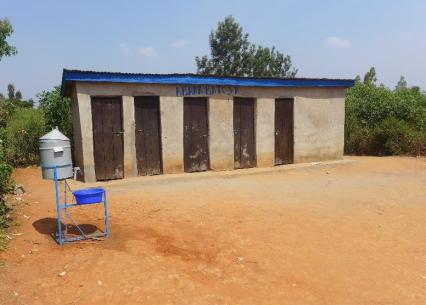This World Water Day, there are still around 663 million people without access to clean drinking water sources, and over 2.4 billion people lacking access to basic sanitation services. Yet, access to clean drinking water and WASH facilities are at the core of ensuring health, education, and human and economic development.
Through the work we do at Co2Balance, we are committed to working towards the goals of clean water and sanitation access for all. The impacts that these can have, notably in creating effective and positive learning environments, can keenly be felt in our school WASH programmes, which have been carried out in 4 schools in Northern Uganda, and most recently in 4 schools in Rwanda.
In Gatsibo, a district in the northern part of Rwanda’s Eastern Province, low levels of infrastructure particularly impacted schools, most notably with a lack of electricity, lack of access WASH training, and a lack of government support to maintain school facilities. Along with our partner, Rwandans 4 Water, we have been working in Gatsibo to rehabilitate 63 boreholes to provide communities with vital clean water access, as well as working in 4 schools to rehabilitate school latrines, install 250 hand-washing points, provide WASH training, form WASH Clubs, and provide solar charging and lighting points.

WASH Clubs, that promote and share WASH techniques and training with their school bodies, have been particularly successful. Each club now boasts more than 30 student members that organise events and performances related to WASH themes. We are now even looking at how we can expand the WASH Clubs nation-wide.
Anualite Murikatete, who leads the WASH club at Ntete Primary School expressed great satisfaction at the way in which pupils have taken on key WASH messages, noting they have taken on WASH approaches very well, particularly in regard to using the newly installed handwashing points.
Emmanuel Nyonzima, a P6C pupil at Gorora Primary School, was particularly enthusiastic about the new facilities and WASH Club in his school:

“We are very happy to see the facilities that are now in the school. Now the toilets are private and have platforms so you can go there without fear for the hygiene situation. We also now have handwashing points at the school. Thanks to this club which is doing a lot of demonstrations, all the pupils now know about the need to wash our hands after using the toilet, and we have facilities to do that.”
The rehabilitation of latrines and handwashing facilities have also created significant positive wider impacts in the schools, with Ruth Muhorakeye, the Deputy Head Teacher at Gogora Primary School saying:
“Making the toilet facilities private and enclosed was very important for the dignity of the pupils here, especially for the girls who suffered great shame at having nowhere to privately relieve themselves. We are very happy that pupils don’t have to worry about this anymore. We now see pupils washing their hands every time they use the latrine, and following the WASH training, teachers report that children are now engaging much more enthusiastically in keeping the classrooms and school clean.”
